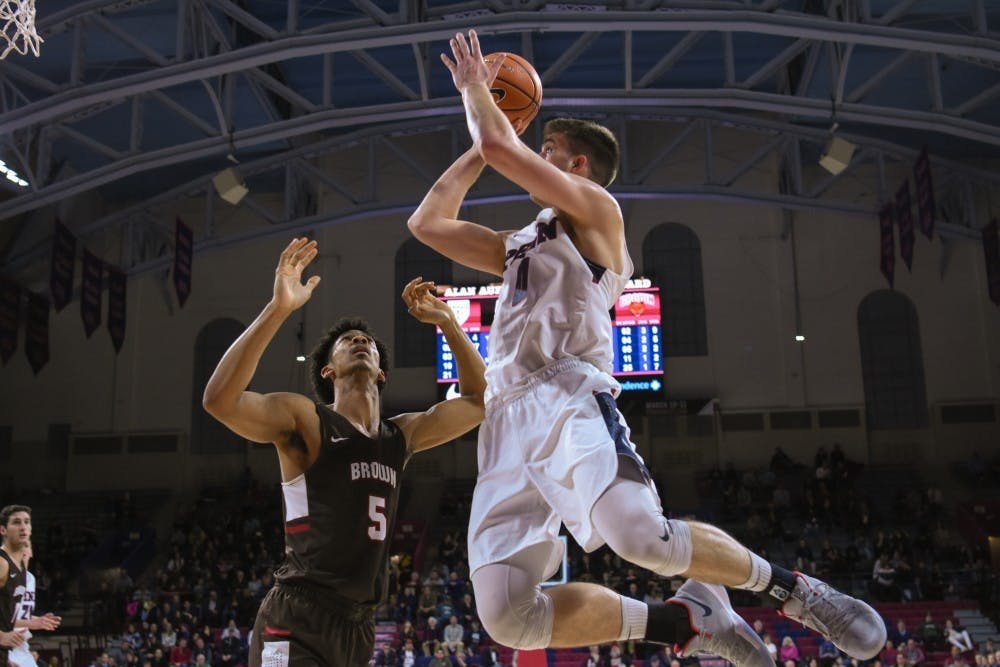Before a big game against Princeton on Tuesday, Penn has already established itself at the top of the Ivy League.
In two exciting back-to-back wins in the Palestra against Brown and then Yale, by scores of 95-90 and 59-50 respectively, the Quakers demonstrated a versatility unseen in recent Penn squads that might just take them the distance this year — at the Ivy tournament and beyond.
If they are struggling from deep? Dominate the paint. If the shots aren’t going in? Play stingy defense. Penn just seems to have an answer for almost any obstacle they face.
The Quakers (15-6, 5-0 Ivy), however, aren’t a perfect team. Their desire for improved offensive balance has led to many inefficient possessions. In both the Brown (10-9, 3-3) and Yale (9-13, 2-4) games, guards attempting to slide passes into especially tight windows led to numerous, unnecessary turnovers. And despite picking up wins in both of its last two matchups, Penn coughed up the ball at a higher rate than its opponent in both games.
If the Quakers can learn to approach their offense with a more settled demeanor, the team certainly has the offensive firepower to win even bigger.
These turnovers and an occasionally hasty offense can lead to scores that are too close with respect to the talent and chemistry of this 2017-2018 team, but so far, this year’s tough defensive mindset has turned many of these back-and-forths into wins lately.
These mistakes, so far, have not been costly, but if the Quakers expect to handle teams vying for their spot at the top of the conference, they will need to be more focused when making passes and creating good, open looks at the basket. Furthermore, if the Quakers wish to defend the Palestra during the Ivy League tournament and make any sort of impact in the big dance, fewer miscues are of paramount importance.
Despite spontaneous struggles on offense, a cornerstone of the Quakers’ identity this year has been their defense.
RELATED
Penn men's basketball beats Brown, 95-90 in overtime thriller
Penn men's basketball finishes strong weekend with win over Yale
“Defense is what we’re about,” coach Steve Donahue said following Penn’s win over Yale. “That’s how I think we’re going to win.”
And, per the stats, it certainly has been in Penn’s most recent victory against the Bulldogs. Penn had eight points off of turnovers and limited Yale to shooting 1 for 19 from deep and less than 35 percent overall.
Another aspect of Penn’s strong outings these past two days has been producing runs through limited-minutes players such as Jake Silpe, who managed to knock down to clutch threes that demoralized Yale enough to ensure Penn’s Ivy League reign this past weekend.
“The reason [Silpe’s] playing is because he carved himself a role,” Donahue said.
Silpe’s climbing of the ladder is reflective of many players’ rises this year, one of those players being Max Rothschild, who, when paired with fellow paint-dweller AJ Brodeur, can wreak havoc on opposing defenses.
According to Donahue, Rothschild has improved greatly this past offseason, losing 10 pounds and then gaining 15 pounds of muscle. Rothschild’s more athletic build has allowed him to handle a more varied post game where the offense starts and ends down low.
“When we got two bigs like [AJ and me], the low-post is a big advantage,” Rothschild said.
The paint has become a favorite starting point for the Quakers’ offense, where penetration leads to kick-out threes, elusive layups, or fancy post moves via Rothschild and Brodeur. Penn, versus both Brown and Yale, picked up 34 points in the paint and combined for 13 threes, demonstrating this new offensive approach.
With a lot of its game being dependent on post play and gritty defense, you’d expect Penn to pick up a gross number of fouls, and yet, in these past two matchups and in many cases throughout their successful season, Penn has not been fouling as much as its opponent.
Coach Donahue has worked to infuse this no-fouling methodology into the Quakers’ DNA and it has so far worked out. For instance, despite a relatively poor defensive performance versus Brown, Penn’s disciplined play and resulting lack of fouling in the final minutes of OT helped them come out with a W.
“We don’t send opponents to the line for free shots, and so they have to make tough 2s,” Rothschild said.
While many might criticize this approach, for it put them down early against Brown, it certainly has helped the team put together wins down the line.
The upcoming game at Princeton on Tuesday will answer the questions as to whether or not Penn has solidified its unique identity and can take the next step from good to great, but what people can’t put into question as of right now is the Quakers’ surprising dominance across the board.



